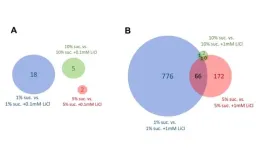(Press-News.org) The Lancet: Managing gestational diabetes much earlier in pregnancy can prevent complications and improve long-term health outcomes, experts say
Speaking at the American Diabetes Association 84th Scientific Sessions, authors of a new Lancet Series challenge current approaches to managing gestational diabetes (a type of diabetes that can be diagnosed during pregnancy) and call for initiating treatment much earlier to prevent complications during pregnancy and beyond. [1].
Gestational Diabetes Mellitus (GDM), commonly referred to as gestational diabetes, is the most common medical pregnancy complication worldwide, affecting one in seven pregnancies (14%). GDM cases are increasing globally and becoming more complex due to higher levels of risk factors such as obesity.
Without treatment, gestational diabetes can lead to high blood pressure, increased risk of Caesarean sections, mental health conditions, and complications for the baby at delivery, alongside health complications for the mother later in life, such as type 2 diabetes and cardiovascular disease.
Recent evidence suggests that the foundations for developing GDM occur before pregnancy, with metabolic changes often detectable in early pregnancy (before 14 weeks). However, GDM is typically only tested for and treated late into the second or third trimester of pregnancy (24-28 weeks).
Authors call for the urgent introduction of strategies to prevent and manage GDM throughout a woman’s life, including earlier testing and diagnosis to reduce pregnancy and delivery complications and decrease the risk of developing other health conditions later in life.
A shift in testing for and managing Gestational Diabetes Mellitus (GDM) to much earlier in pregnancy (before 14 weeks) can prevent health complications for both the mother and baby, according to a new Series published in The Lancet. Series authors challenge the current approach to GDM management – which focuses on late GDM (24 weeks+) – and call for better detection and prevention efforts alongside a personalised, integrated life-course approach for those who experience or are at risk for GDM.
GDM, also known as gestational diabetes – a type of diabetes that is found during pregnancy where blood glucose levels are higher than average but not as high as diabetes – is the most common medical pregnancy complication worldwide, affecting one in seven (14%) of pregnancies. As obesity and other metabolic conditions continue to increase around the world, more women of reproductive age will experience some degree of abnormal glucose/insulin regulation, which leads to higher risks of pregnancy complications as well as health conditions later in life, such as type 2 diabetes (T2D) and cardiovascular disease.
“Our new Series emphasises the urgent need for a major shift in how GDM is first diagnosed and managed, not only during pregnancy but throughout the lifetime of mothers and their babies,” said Series lead Prof. David Simmons of Western Sydney University, Australia. “GDM is an increasingly complex condition, and there isn’t a one-size-fits-all approach to managing it. Instead, a patient’s unique risk factors and metabolic profile should be considered to help guide them through pregnancy and support them afterward to achieve the best health outcomes for women and babies everywhere.”
GDM and its complications are on the rise
As obesity continues to increase worldwide, along with impaired glucose tolerance and T2D rates in women of reproductive age, GDM prevalence has also increased two to threefold across multiple countries over the last 20 years. The current GDM prevalence rates range from over 7% in North America and the Caribbean region to almost 28% in the Middle East and North Africa region.
Between 30% and 70% of women with GDM experience high blood glucose (hyperglycemia) from early pregnancy (20 weeks gestation or sooner, also known as early GDM). These women have worse pregnancy outcomes compared to women whose GDM is not present until later in pregnancy (24-28 weeks). Even later in pregnancy, in studies where GDM was not managed adequately (e.g., where insulin was needed but not used), GDM was associated with increased risks of cesarean delivery (16%), preterm delivery (51%), and large for gestational age babies (57%). Other studies that looked at GDM pregnancies requiring insulin therapy found it was associated with a more than two-fold increased risk of neonatal intensive care unit admission.
Women diagnosed with GDM have a 10-fold higher risk of developing T2D later in life compared to women who did not experience GDM. They are also more likely to have co-existing hypertension, dyslipidemia (high blood lipid levels), obesity, and fatty liver, with a two-fold higher risk for developing cardiovascular disease during their lifetime.
Women with GDM also experience more significant risks of mental health conditions, including stress, depression, and anxiety, along with stigma and feelings of guilt and shame related to GDM during pregnancy. Beyond their own impacts, these feelings of guilt and shame can lead to additional adverse outcomes if patients avoid testing glucose levels or taking insulin because of them.
Recent studies have suggested that GDM diagnosis may be associated with an increased risk of subsequent postpartum depression. Conversely, treatment of late GDM is associated with lower rates of depression at three months postpartum, while treatment of early GDM is associated with improvement of quality of life at 24 to 28 weeks gestation.
“GDM is a tremendous public health challenge. Women who experience it need support from the medical community, policymakers, and society as a whole to ensure they can effectively access proper treatment, reduce the stigma associated with GDM, and improve their overall pregnancy experience,” said Series author Dr Yashdeep Gupta of the All India Institute of Medical Science.
Early diagnosis for a lifetime of better health outcomes
GDM has historically been considered a pregnancy complication involving the treatment of high blood glucose levels late in the second trimester. The World Health Organization’s current diagnostic criteria for GDM recommends testing at 24-28 weeks gestation without prior screening. [2]
However, recent evidence suggests that GDM has foundations before pregnancy and can be present in early pregnancy. Overall, 30-70% of GDM can be found early using oral glucose tolerance testing and includes those at most significant risk of requiring insulin therapy and experiencing pregnancy complications.
Recent studies, such as the TOBOGM RCT [3], showed that among women with early GDM, identification, and treatment before 20 weeks gestation (compared to 24-28 weeks) not only reduced pregnancy complications and postpartum complications, including neonatal respiratory distress and length of stay in neonatal intensive care units, but also improved quality of life mid-pregnancy and increased breastfeeding initiation, which can reduce the likelihood of developing obesity, T2D, and other long-term conditions.
“The benefits of early GDM detection are clear – we can keep mothers and babies healthier during pregnancy and hopefully continue that path for a lifetime. What is needed now is earlier testing and an approach to managing GDM that takes the available resources, circumstances, and personal wishes of the patient into consideration,” said Series author Dr Helena Backman of Örebro University, Sweden.
New strategies are urgently needed to improve GDM management
A better understanding of GDM and its effects can help researchers, clinicians, and policymakers develop new management approaches that focus on improved prevention and treatment of GDM complications from pre-conception through pregnancy and beyond.
The recommended strategies developed by the Series authors include:
- Early GDM testing of those with risk factors, ideally before 14 weeks gestation.
- Promoting health at the population level that prepares women, especially those with risk factors for a healthy pregnancy and, after that, for healthy aging.
- Improve antenatal care that includes postpartum screening for glycemic status.
- Tailored annual assessments in women with prior GDM to prevent or better manage complications such as T2D (particularly in subsequent pregnancies) and cardiovascular disease.
- More research into GDM and how to improve outcomes of women with GDM and their children across the life course.
“It is past time to move from ‘late pregnancy’ focused services to an integrated, personalized life-course strategy across both high- and low-resource settings. This includes new, systematic approaches to prevention, early GDM treatment, identifying and overcoming barriers to uptake, better health system integration, and more research to better understand how GDM affects women and their children during pregnancy and throughout their lives,” said Prof. Simmons.
NOTES TO EDITORS
A full list of researchers and institutions is included in the Series papers.
Regional and country-level data is publicly available via the IDF Diabetes Atlas: https://diabetesatlas.org/atlas/tenth-edition/
[1] The Series will be presented during the 84th Scientific Sessions of the American Diabetes Association on Monday, 24 June 2024, at 1:30 p.m. ET and will be open to media and delegates attending the conference. Full program details are available here: https://professional.diabetes.org/scientific-sessions
[2] 2013 World Health Organization (WHO) Diagnostic Criteria and Classification of Hyperglycaemia First Detected in Pregnancy https://iris.who.int/bitstream/handle/10665/85975/WHO_NMH_MND_13.2_eng.pdf
[3] Treatment of Gestational Diabetes Mellitus Diagnosed Early in Pregnancy, Simmons et al. New England Journal of Medicine; 5 May 2023, https://www.nejm.org/doi/full/10.1056/NEJMoa2214956
The labels have been added to this press release as part of a project run by the Academy of Medical Sciences seeking to improve the communication of evidence. For more information, please see: http://www.sciencemediacentre.org/wp-content/uploads/2018/01/AMS-press-release-labelling-system-GUIDANCE.pdf if you have any questions or feedback, please contact The Lancet press office pressoffice@lancet.com
END
The Lancet: Managing gestational diabetes much earlier in pregnancy can prevent complications and improve long-term health outcomes, experts say
2024-06-21
ELSE PRESS RELEASES FROM THIS DATE:
New study finds dinosaur fossils did not inspire the mythological griffin
2024-06-21
A popular and widely-promoted claim that dinosaur fossils inspired the legend of the griffin, the mythological creature with a raptorial bird head and wings on a lion body, has been challenged in a new study.
The specific link between dinosaur fossils and griffin mythology was proposed over 30 years ago in a series of papers and books written by folklorist Adrienne Mayor. These started with the 1989 Cryptozoology paper entitled ‘Paleocryptozoology: a call for collaboration between classicists and cryptozoologists’, and was cemented in the seminal 2000 ...
NASA astronaut Woody Hoburg to deliver keynote address at ISSRDC focused on developing a space workforce
2024-06-20
BOSTON (MA), June 20, 2024 – NASA astronaut Warren “Woody” Hoburg will deliver a keynote address at the International Space Station Research and Development Conference (ISSRDC) in Boston on Thursday, August 1, 2024. Hoburg has close ties to Boston as a graduate and former assistant professor of aeronautics and astronautics at the Massachusetts Institute of Technology (MIT).
Hoburg’s address will focus on his six-month science expedition on the space station and the importance of shaping the future workforce ...
Study: Fatigue-management training improved sleep, safety, well-being for Seattle police
2024-06-20
Policing is a profession that features shift work and long hours, both of which can lead to insufficient sleep and fatigue. Because of the unique demands of the job, fatigue raises risks related to decision making, impulse control, driving, and other aspects of work. In a new study, researchers tested the effect of a fatigue-management program on the sleep, mental health, well-being, and safety of police employees in Seattle. The training improved sleep duration as well as various aspects of employees’ safety and well-being.
The study, by researchers at Washington State University (WSU) and the Seattle Police Department, ...
Guiding humanity beyond the moon: OHIO’s Nate Szewczyk and students coauthor papers published in “Nature” journals that revolutionize human space biology
2024-06-20
What actually happens to the human body in space? While scientists and researchers have heavily researched how various factors impact the human body here on Earth, the amount of information available about changes that occur in the body in space is not as well-known. Scientists, including OHIO’s Nate Szewczyk and several of his trainees, have been studying for years how the body, specifically on the molecular side, changes in space. Recently, a new package of papers has been published in “Nature” journals depicting how the modern tools of molecular biology and precision medicine can help guide humanity into more challenging missions beyond where we’ve already been.
The ...
Grant supports research to identify barriers to health care for Black women
2024-06-20
A $1.58 million grant will support work by a health communication scholar at the University of Tennessee (UT) Health Science Center’s College of Nursing and a medical oncologist at West Cancer Center and Research Institute (WCCRI) to identify sociocultural and structural factors that are root causes of cancer health disparities for Black women in the Mid-South.
Assistant Professor Janeane Anderson, PhD, MPH, is a social scientist and health communication scholar at the College of Nursing whose research focuses on how interpersonal factors affect ...
Scientists at uOttawa develop innovative method to validate quantum photonics circuits performance
2024-06-20
A team of researchers from the University of Ottawa’s Nexus for Quantum Technologies Institute (NexQT), led by Dr. Francesco Di Colandreanorth_eastexternal link, under the supervision of Professor Ebrahim Karimi, associate professor of physics, has developed an innovative technique for evaluating the performance of quantum circuits. This significant advancement, recently published in the prestigious journal npj Quantum Information, represents a substantial leap forward in the field of quantum computing.
In the rapidly evolving landscape of quantum technologies, ...
New report on community-centered approach to providing vaccine education and resources to persons experiencing homelessness during COVID-19
2024-06-20
(Boston)— A community-support model for providing health resources and education is a way to continuously engage unhoused people and other underserved groups who are particularly vulnerable during health emergencies like the COVID-19 pandemic.
“Having a stable system for bringing health information to unhoused people and connecting them to providers at Boston Health Care for the Homeless Program (BHCHP), is a pathway for addressing a number of health issues they experience,” said Kareem King, Jr., research program manager at Boston University’s Clinical & Translational Science ...
Government updates race and ethnicity data collection standards: implications and insights
2024-06-20
New Rochelle, NY, June 20, 2024–The latest issue of the peer-reviewed journal Health Equity features a pivotal roundtable discussion titled “Implications and Insights on Federal Revisions to Race and Ethnicity Collection.” This roundtable assembles leading experts to explore newly revised race and ethnicity data collection standards from the Office of Management and Budget (OMB), highlighting the significant impact these changes have on policy and practice. The expanded standards now capture historically marginalized communities, ...
Dr. Vivek S. Kavadi named CEO of the American Society for Radiation Oncology (ASTRO)
2024-06-20
ARLINGTON, Va., June 20, 2024 — The American Society for Radiation Oncology (ASTRO) announced today that following a nationwide search, Vivek S. Kavadi, MD, MBA, FASTRO will become CEO of the Society effective November 1, 2024. Dr. Kavadi will succeed Laura Thevenot, who previously announced her intent to retire after leading the organization since 2002.
Dr. Kavadi, a radiation oncologist and ASTRO member since 1994, ascends to the role from his current position as Chief Radiation Oncology Officer for The ...
Dietary sucrose determines activity of lithium on gene expression and lifespan in drosophila melanogaster
2024-06-20
“[...] we found that, in female D. melanogaster, the life-prolonging effect of dietary lithium is dependent on the actual sucrose content of the medium.”
BUFFALO, NY- June 19, 2024 – A new research paper was published in Aging (listed by MEDLINE/PubMed as "Aging (Albany NY)" and "Aging-US" by Web of Science) Volume 16, Issue 11, entitled, “Dietary sucrose determines the regulatory activity of lithium on gene expression and lifespan in Drosophila melanogaster.”
The amount of dietary sugars and the administration of lithium both impact the lifespan of the fruit fly Drosophila melanogaster. It is noteworthy that lithium ...







